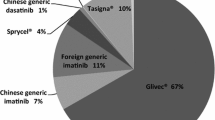Abstract
Purpose
Explore molecular monitoring patterns of patients with chronic myeloid leukemia (CML) on tyrosine kinase inhibitors therapy in China and identify variables associated with monitoring patterns.
Methods
Non-interventional, cross-sectional study using questionnaires distributed to persons with CML and answered anonymously.
Results
A total of 819 respondents in chronic phase outside clinical trials were evaluable; 477 respondents (58 %) were male. Median age was 41 years (range 18–88 years). A total of 609 (74 %) respondents received a TKI <1 year after diagnosis and 665 (81 %) were on a branded TKI. Median TKI therapy duration was 3 years (range <1–13 years). A total of 255 (31 %) respondents had a molecular test every 3 months, and 280 (34 %), every 6 months. Multivariate analyses showed that older age, starting TKI therapy >1 year after diagnosis and generic TKI use were associated with deviation from recommended monitoring frequency (both every 3 months and every 3 or 6 months). In addition, TKI therapy duration >3 years and imatinib use were associated with under-testing every 3 months. Rural household registration was associated with less testing at every 3 or 6 months. The most commonly stated reasons for under-testing were no requirement by physician (60 %), followed by cost (19 %), no necessity (10 %) and no eligible lab nearby (10 %).
Conclusions
Many Chinese with chronic phase CML receiving TKI therapy do not have response monitoring compliant with recommended guidelines. Older age, financial burden and physician non-adherence to guideline recommendations are associated with low monitoring frequencies.



Similar content being viewed by others
References
Baccarani M, Deininger MW, Rosti G et al (2013) European LeukemiaNet recommendations for the management of chronic myeloid leukemia. Blood 122:872–884
Chen L, Guerin A, Xie J et al (2012) Monitoring and switching patterns of patients with chronic myeloid leukemia treated with imatinib in community settings: a chart review analysis. Curr Med Res Opin 28:1831–1839
Cross NC, White HE, Müller MC, Saglio G, Hochhaus A (2012) Standardized definitions of molecular response in chronic myeloid leukemia. Leukemia 26(10):2172–2175
Cross NC, Hochhaus A, Müller MC (2015a) Molecular monitoring of chronic myeloid leukemia: principles and interlaboratory standardization. Ann Hematol 94(Suppl 2):S219–S225
Cross NC, White HE, Colomer D et al (2015b) Laboratory recommendations for scoring deep molecular responses following treatment for chronic myeloid leukemia. Leukemia 29(5):999–1003
Egan D, Radich J (2015) Prognosis and molecular monitoring in chronic myeloid leukemia. Clin Lymphoma Myeloma Leuk 15(Suppl):S109–S113
Goldberg SL (2015) Monitoring chronic myeloid leukemia in the real world: gaps and opportunities. Clin Lymphoma Myeloma Leuk 15(12):711–714
Goldberg SL, Chen L, Guerin A et al (2013) Association between molecular monitoring and long-term outcomes in chronic myelogenous leukemia patients treated with first line imatinib. Cur Med Res Opin 29:1075–1082
Goldberg SL, Cortes JE, Gambacorti-Passerini C et al (2014) Cytogenetic and molecular testing in patients with chronic myeloid leukemia in a prospective observational study (SIMPLICITY). J Clin Oncol (ASCO Annual Meeting Abstracts) 32; abstract 7050
Goldberg SL, Akard LP, Dugan MJ, Faderl S, Pecora AL (2015) Barriers to physician adherence to evidence-based monitoring guidelines in chronic myelogenous leukemia. J Oncol Pract 11:e398–e404
Guérin A, Chen L, Dea K, Wu EQ, Goldberg SL (2014a) Association between regular molecular monitoring and tyrosine kinase inhibitor therapy adherence in chronic myelogenous leukemia in the chronic phase. Curr Med Res Opin 30:1345–1352
Guérin A, Chen L, Dea K, Wu EQ, Goldberg SL (2014b) Economic benefits of adequate molecular monitoring in patients with chronic myelogenous leukemia. J Med Econ 17:89–98
National Comprehensive Cancer Network (2015) NCCN clinical practice guidelines in oncology: chronic myelogenous leukemia version 1 (2016) Fort Washington PA. National Comprehensive Care Network. 2015. http://www.nccn.org/professionals/physician_gls/pdf/cml.pdf. Accessed 26 Mar 2016
Radich JP (2014) Monitoring molecular response to tyrosine kinase therapy in chronic myelogenous leukemia. J Natl Compr Cancer Netw 12(5 Suppl):817–820
Saleh MN, Haislip S, Sharpe J et al (2014) Assessment of treatment and monitoring patterns and subsequent outcomes among patients with chronic myeloid leukemia treated with imatinib in a community setting. Curr Med Res Opin 30:529–536
Acknowledgments
This study was funded by National Natural Science Foundation of China (No. 81370637). RPG acknowledges support from the National Institute of Health Research (NIHR) Biomedical Research Centre funding scheme.
Author contributions
JQ designed the study, collected, analyzed and interpreted the data, and drafted the article. RPG interpreted the data and drafted the article. All authors read and approved the final typescript.
Author information
Authors and Affiliations
Corresponding author
Ethics declarations
Conflict of interest
All authors declare that they have no conflict of interest.
Ethical approval
All procedures performed in studies involving human participants were in accordance with the ethical standards of the institutional and/or national research committee and with the 1964 Helsinki declaration and its later amendments or comparable ethical standards.
Informed consent
Because the survey used anonymous questionnaires, the Ethics Committee of Peoples Hospital determined informed consent of participants was not required.
Electronic supplementary material
Below is the link to the electronic supplementary material.
Rights and permissions
About this article
Cite this article
Jiang, Q., Gale, R.P. Molecular monitoring of tyrosine kinase inhibitor therapy of chronic myeloid leukemia in China. J Cancer Res Clin Oncol 142, 1549–1555 (2016). https://doi.org/10.1007/s00432-016-2158-8
Received:
Accepted:
Published:
Issue Date:
DOI: https://doi.org/10.1007/s00432-016-2158-8




